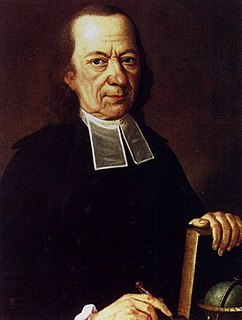
Friedrich Christoph Oetinger was a German Lutheran theologian and theosopher.
Avienus was a Latin writer of the 4th century AD. An inscription from Bulla Regia, a former Roman city located in modern-day Tunisia, reports his full name as "Postumius Rufius Festus who is also Avienius". He was a native of Volsinii in Etruria, from the distinguished family of the Rufii Festi. He was twice appointed consul, if an inscription published by the 17th-century antiquaries Jacob Spon and Raffaello Fabretti really refers to this Avienus.

Raimund Pretzel, better known by his pseudonym Sebastian Haffner, was a German journalist and author. He wrote mainly about recent German history. His focus was specifically on the history of the German Reich (1871–1945); his books dealt with the origins and course of the First World War, the failure of the Weimar Republic, and the subsequent rise and fall of Nazi Germany under Hitler. His most known work is The Meaning of Hitler, a short biography and analysis of Hitler.
Gottfried Boehm is a German art historian and philosopher.

Johann David Köhler was a German historian. His academic focuses were on Roman coins as historical artifacts, ancient weapons, and genealogy. Köhler also served as university librarian at Altdorf and contributed to the early library science literature.

Arnis is the smallest town in Germany both by population and by area. At a population of c. 300 and a total area of 0.45 km2, Arnis is part of the Amt Kappeln-Land in the district of Schleswig-Flensburg, in Schleswig-Holstein, Germany. It was founded in 1667 by shipping families from the nearby village Kappeln who wanted to avoid serfdom. The local Skipper's Church was erected in 1673. Originally Arnis was a skipper town with up to 90 sailing-ships (1864). In the late 20th century four shipyards were the basis of its economy. Today Arnis is a tourism showplace.

Henryk Marcin Broder is a Polish-born German journalist, author and TV personality.

Joachim Latacz is a German classical philologist.
Gerhard Herm was a German journalist and writer.
Professor Eckhard Jesse is a German political scientist. He holds the professorship for "political systems, political institutions" at the Technical University of Chemnitz. Jesse is one of the best known German political scholars in the field of extremism and terrorism studies. He has also specialized in the study of German political parties and the German political system.
Georges Nicolas Tamer holds the Chair of Oriental Philology and Islamic Studies at the Friedrich-Alexander-University Erlangen-Nuremberg. Until September 2012, he was professor of Arabic and Islamic studies and the holder of the M.S. Sofia Chair in Arabic Studies at the Ohio State University in Columbus, Ohio. A scholar of religion, philosophy, and Arabic and Islamic literature and culture, his fields of specialization include Qur'anic studies, Arabic philosophy, Christian- and Judeo-Arabic thought, and Islam in modernity. He has previously taught at the Freie Universität Berlin, the University of Erlangen-Nürnberg, and the Central European University.

The United Grand Lodges of Germany is an association (confederation) of the five Grand Lodges of Freemasons in Germany which are recognized as regular by the United Grand Lodge of England, and represents them all at an international level.

Marietta Piekenbrock is a German art curator, dramaturge, author and a cultural manager. Her projects combine theatre, dance, performances and music with cultural history, architecture and everyday life. As an artistic manager of the Cultural Capital of Europe RUHR.2010 and Istanbul.2010, and for the Ruhrtriennale 2012-14, she invited international artists and curators to collaborate with the local cultural participants and players on developing new aristic projects in areas of radical social change. Her programmes of events and initiatives made a strong case for sustainable cultural practice. Her 2012 series of events "No Education" promoted a new discourse on the relationship between art, children and education.
Michael Diers is a German art historian and professor of art history in Hamburg and Berlin.
Irma Wehgartner is a German Classical archaeologist.
Hartwin Brandt is a German ancient historian.

Johannes Stroux was a German classicist, scholar of Roman law and organizer of scientific projects and organizations. In 1945 he became rector of the Berlin University and president of the Berlin Academy of Science.
Lothar Mertens was a prolific German historian and social sciences scholar. A principal focus of his output was on the German Democratic Republic.
Gerd R. Ueberschär is a German military historian who specialises in the history of Nazi Germany and World War II. He is one of the leading contributors to the series Germany and the Second World War and, together with Rolf-Dieter Müller, is the author of Hitler's War in the East 1941−1945: A Critical Assessment. Both works have been published in English translations.
War in History is a German non-fiction book series established in 1999. Published by Verlag Ferdinand Schöningh, it focuses on the latest research in military history. The editors include historians Stig Förster of the University of Bern, Bernhard R. Kroener of the University of Potsdam, Bernd Wegner of the Helmut Schmidt University and Michael Werner (historian) of the École des Hautes Études en Sciences Sociales.









